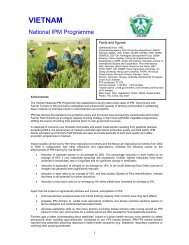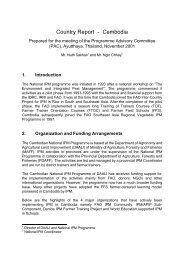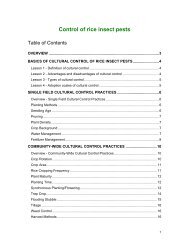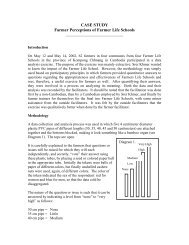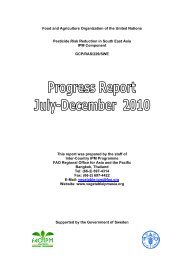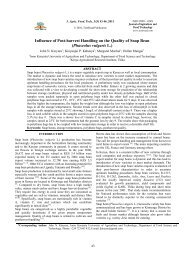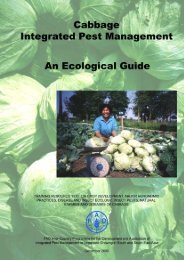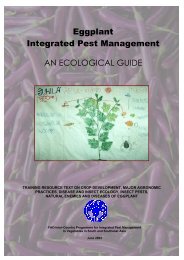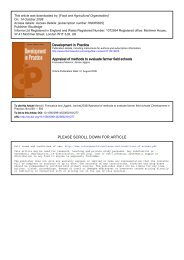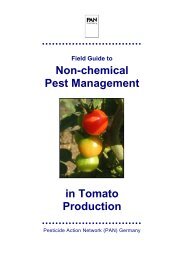Sustainable Potato Production - Guidelines for - FAO.org
Sustainable Potato Production - Guidelines for - FAO.org
Sustainable Potato Production - Guidelines for - FAO.org
- No tags were found...
Create successful ePaper yourself
Turn your PDF publications into a flip-book with our unique Google optimized e-Paper software.
Building support at policy levelGlobally, potato production is growingat a rate of 2 percent annually whilein developing countries, growth isestimated at around 5 percent.Sustaining the exceptional growth in potatoproduction of the past two decades – from268 million tonnes in the early 1990s to 325million tonnes in 2007 – and the expansionof potato domestic trading in developingcountries depends on choosing the rightpolicy and research options <strong>for</strong> developmentof the agricultural sector and potato-basedfarming systems. The policy and researchagenda is expected to shift from thetraditional focus on raising productivity to abroader approach that makes a realcontribution to the fight against hunger,poverty and environmental degradation byimproving rural income, livelihoods,nutrition, health, and conserves the naturalresource base.Policy re<strong>for</strong>ms are a needed if developingcountries wish to develop and promote asustainable potato industry and agriculturalsector. This implies overcoming currenttrade barriers, including the lack ofharmonized transit charges and customsdocumentation. It also implies overcomingcurrent barriers to sustainable productionintensification based on good agriculturalpractices.Policy makers need to be more aware ofthe contribution that the potato is alreadymaking to development and food security,and of its importance as a staple food andcash crop in developing countries. In theprocess of revising poverty reduction strategypapers (PRSPs), and in <strong>for</strong>mulatingstrategies <strong>for</strong> agricultural development, theyshould take into account the needs andpotentials of the potato subsector andsupport its more active engagement in thedevelopment process.One important policy aim in developingcountries should be to enhance the value ofpotato production by establishing linksbetween farmers and food processors,improving credit availability, and fosteringpublic-private partnerships <strong>for</strong> technologyinnovation. By engaging interested partnersfrom the public and private sectors and civilsociety, policy can facilitate the developmentof focused country-level programmes,projects and activities to support asustainable potato subsector.Policy should also create a regulatoryenvironment conducive to sustainablepotato development through support <strong>for</strong>knowledge enhancement and research,application of best management practices,and sharing and promotion of proven andadvanced potato technologies througheducation, extension and training.Policy should address constraints onpotato-based production systems byfavouring the introduction of good qualityplanting material and potato varieties moreresistant to insect pests, diseases, waterscarcity and climate change, farmingsystems that can make optimum use ofnatural resources, seed certification schemesand soil testing laboratories.Policy will also have to secure financialcommitments from national governments,donors and the private sector to invest inpotato-based systems and value chains. Indoing so, policy makers should encourage astronger commitment by the potatocommunity to potato subsectordevelopment.69IMPLICATIONSFOR POLICYAND RESEARCH



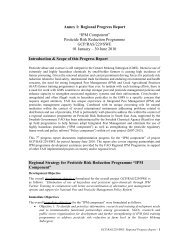
![Section 4 [ PDF file, 252 KB] - The Field Alliance](https://img.yumpu.com/51387260/1/158x260/section-4-pdf-file-252-kb-the-field-alliance.jpg?quality=85)
